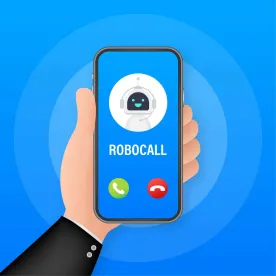At its May Open Meeting, the Federal Communications Commission (“Commission”) took additional steps to close some of the remaining gaps in its robocalling rules. In particular, the Commission adopted a Seventh Report and Order imposing a requirement for all voice service providers to fully respond to all traceback requests within 24 hours — currently, the obligation only applies to gateway providers (those providers that serve as the entry point for foreign-originated calls to U.S. telephone networks). Similarly, the Commission extended the requirement that a provider “know” the upstream provider from which it directly receives call traffic. This will obligate providers that receive traffic from an upstream provider — i.e., terminating providers — to take actions such as collecting information about the upstream provider’s physical business location, contact person(s), the state or country of incorporation, its federal tax identification number, and information about the nature of the upstream provider’s business.
The Commission also expanded the requirement to block suspected illegal traffic when notified of such activity by the Commission, currently applicable only to gateway providers, to originating providers. Under the requirements, when notified by the Commission’s Enforcement Bureau that certain call traffic is suspected illegal traffic, the originating provider must block and cease transmitting that traffic and substantially similar traffic. However, terminating and non-gateway intermediate providers are not required to block but rather must identify the upstream provider from whom they received the illegal traffic unless the originating provider fails to cease transmitting the illegal traffic; then the Enforcement Bureau may issue a Final Determination Order requiring the terminating or intermediate provider to block that traffic.
In imposing these mitigation and blocking requirements on a broader set of providers, the Commission seeks to harmonize its rules across the entire call path, thereby preventing gaps or loopholes where bad actors may transmit unlawful calls into U.S. networks. The Commission has taken, and continues to take, an incremental approach, collecting input from stakeholders each time it seeks to expand the reach of its rules. For example, in addition to its Report and Order, it adopted an Eighth Further Notice of Proposed Rulemaking (beginning at paragraph 70), which proposes to require terminating and non-gateway intermediate providers to block suspected illegal traffic when notified by the Commission in certain circumstances, such as when the terminating or intermediate provider cannot identify the upstream provider from whom the illegal traffic is received, or when the Enforcement Bureau has repeatedly sent notifications to the same terminating or intermediate providers.
The Commission also proposes to expand the requirement to block calls based on a reasonable do-not-originate (“DNO”) list. Like the current rules for gateway providers, the Commission’s proposal would mandate that all voice service providers block calls from numbers purporting to be on a reasonable DNO list. The DNO-blocking requirement would require blocking invalid, unallocated, or unused numbers in addition to numbers a subscriber has requested be used for inbound calls only. While noting that it may not capture every possible call since the rules do not mandate using a specific list, the Commission believes extending this requirement to all providers will result in more calls with a higher likelihood of being illegal from reaching consumers.
Finally, the Commission proposes requiring terminating providers to block calls that are highly likely to be illegal —such as large bursts of calls in a short timeframe, calls with a low average duration or low completion ratios, and invalid numbers placing large a large volume of calls — using opt-out analytics–based blocking technology. Terminating providers are currently permitted to engage in this type of blocking but are not required to do so. The Commission believes that requiring this type of blocking will further reduce the number of illegal calls to consumers as some subscribers may not be offered these services or may not be able to afford them even if their provider offers them.
The rules adopted in the Report and Order will not take effect for at least a few months, as they require publication in the Federal Register and Office of Management and Budget Approval in some cases. The Commission seeks comment on the proposals in the Further Notice of Proposed Rulemaking 30 and 60 days, respectively, after publication in the Federal Register.
Noting the long and ongoing efforts to eliminate the problem of illegal robocalling, Chairwoman Rosenworcel praised the work of the Commission thus far in “stopp[ing] more big robocall schemes [in the last two years] than at any point in our history,” but also warned bad actors that there is “no rest for the weary,” and the Commission is “simply not going to stop until we get this junk off the link.”





 />i
/>i

